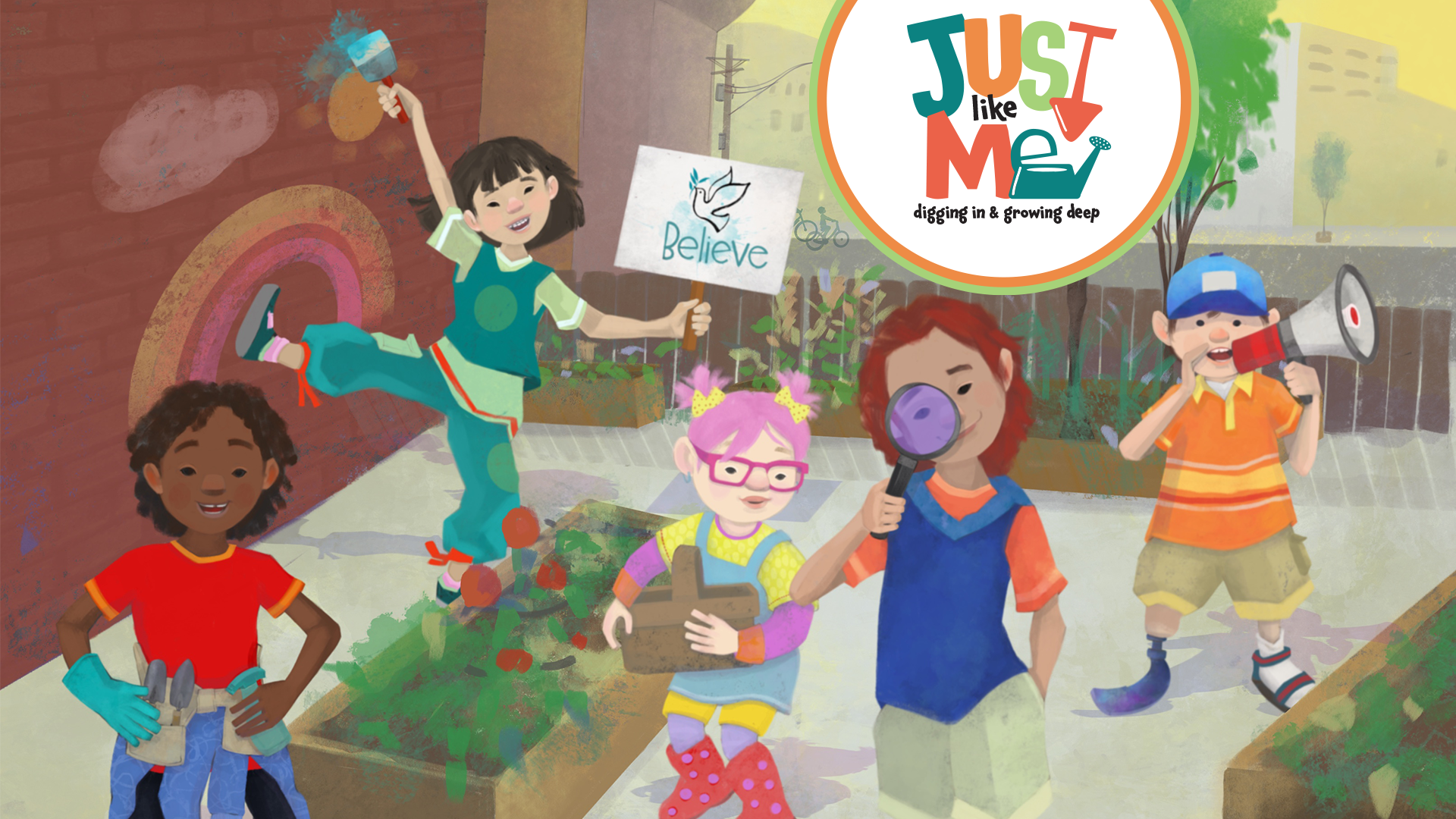Facing a violent world of prejudice and hatred, concerned Christians have searched long and hard for children’s curricula that teach values of empathy and inclusion. Now an organization historically focused on church political advocacy has taken a new path, producing a vacation Bible school program that aims to foster acceptance, respect and community.
Reconciling Ministries Network recently introduced a new VBS program, “Just Like Me: Digging In and Growing Deep.” It is a multigenerational resource that teaches the virtues that build “the beloved community” of Jesus’ gospel, said Reconciling Ministries Resources Director Emily Bagwell.
Team leader Nick Mudwiller said the curriculum resulted from an “exciting” collaboration among educators, scholars, pastors, musicians and writers that reflected the resource’s goal of fostering community.
“Just Like Me” includes basic VBS components such as Bible lessons, crafts, music, opening and closing assembly scripts, volunteer training, facilitation guides and a media kit.

Historically known as a prominent activist in United Methodist politics, Reconciling Ministries Network has evolved as an organization since the 2019 special called General Conference. When that legislative assembly adopted new, more stringent anti-LGBTQ bans, Reconciling Ministries leaders decided they would create culturally the church they desired without waiting for United Methodist laws to change.
The background of the VBS curriculum reflects that changing nature and goals, said both Bagwell and Mundwiller.
According to Bagwell, Reconciling Ministries heeded pleas from pastors, Christian educators and church members for more inclusive educational resources.
“We were constantly hearing from folks about the need for more inclusive resources for local churches,” she said. “We chose to produce from the ground up one of the biggest projects we could have picked.”
Mundwiller said “Just Like Me” began in early 2023 with three days of online consultation that included “thought leaders” in multiple theological perspectives. Those contributors chose Scriptures and themes focused on such characteristics as disability, ethnicity, gender, race and more.
 One of the earliest decisions was to design “Just Like Me” as a multigenerational curriculum with “scaffolded” lessons tying the program together for various ages.
One of the earliest decisions was to design “Just Like Me” as a multigenerational curriculum with “scaffolded” lessons tying the program together for various ages.
Mundwiller and a team of five writers met in person to draft the lessons based on the outline created by the development group.
“The developers knew a lot about what we wanted for inclusion, but they had no experience of teaching 5-year-olds,” Mundwiller said.
With texts drafted, the writing team worked with musicians, child educators and graphic artists. The resulting curriculum was then vetted three times with focus groups and each time revised according to their feedback.
The overall message of the curriculm, Mundwiller said, is: “I need my people; my people are those who love me and accept me as I am.”
Bagwell added: “The biblical characters they’ll meet have very real differences, but we honor differences and respect each other and learn to listen and learn from one another.”
Both Bagwell and Mundwiller said Reconciling Ministries was prepared to respond to potential criticism that “Just Like Me” serves to “groom” children to accept homosexuality, given the organization’s history as an advocate for LGBTQ inclusion and the current U.S. cultural climate.
“Reconciling Ministries has never been in the business of grooming,” Bagwell said. “‘Just Like Me’ isn’t about homosexuality; ‘inclusive’ means accepting people as they are, as God’s beloved, acknowledging the beauty within each person as God created them.”
Mundwiller added: “The curriculum’s main objective is affirming kids’ identities and our collective need for community. It’s also about how to use our voices to stand up for ourselves and others. Although one of the characters uses ‘they/them’ pronouns, there’s not much in the way of LGBT relationships; it’s more about affirming self and building community.”
Mundwiller said that working on “Just Like Me” fulfilled a personal dream to create educational resources that reduce “church hurt,” a trauma that occurs when churches reject people based on prejudices against people of different races, ethnicities and languages, or of disabiling conditions.
“I want a generation of kids to see church as a place to go to be safe, not as a place where they can’t be themselves,” Mundwiller said.
The curriculum is not just for Methodists, Bagwell said. “We wrote ‘Just Like Me’ with the hope that this could be used by a lot of faith communities. It’s consciously inclusive but not politically driven; we hope to open some doors for conversations.”
“Kids who come will sing songs, read Scriptures and meet characters they can identify with,” she said. “We want them to see themselves as belonging to God’s community, sing lyrics that are empowering, feel supported and loved.”


